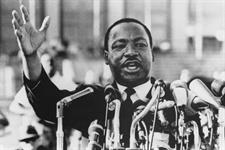What Martin Luther King teaches employers about leadership

Because many societies globally are currently living in commercial and political turmoil, disruptive authentic leadership is critically needed. Martin Luther King’s innovative, groundbreaking leadership style disrupted civil inequity between the white majority and people of colour. Nobody before King could even fathom the oxymoron of peaceful protest. He made white leaders look at their hypocrisy and ultimately agree to begin honouring the constitutional note that “all men are created equal”.
King epitomised four distinct characteristics that gave him the gift of bridging the racial divide like no leader before him, a gift that ultimately brought greater trust, unity, and engagement to his nation. Likewise, to be a successful, disruptive, authentic leader in the business environment, leaders must embrace these four leadership characteristics as well.
People are hungry for this brand of authentic disruptive leadership. We are all witness to the civil unrest within the social landscape as well as the political unrest within multiple governments. Yet within the business world, there often exists friction between managers and their direct reports, CEOs and their board members, and various departments.
Here are the four characteristics that King held to inspire organisational leaders today:
1. Extraordinary commitment
The first characteristic of disruptive authentic leaders is extraordinary commitment. King continuously improved himself to motivate his followers more effectively. His “I have a dream” speech resonated with people because most people had heard of goals or objectives, but not dreams. He had an intense inner commitment that equipped him with more efficient human qualities than his predecessors. Additionally, it was his passion that drove his commitment to raise civil consciousness to a level that touched his listening audience of every ethnicity at a deep emotional level.
2. Permanent change
King perpetuated a superior quality in himself and used each opportunity to continuously change and transform himself. A clear example of this feature can be seen in King’s awareness and friendship with Mahatma Gandhi. His familiarity with Gandhi formed the basis for a permanent change in his thoughts and attitude to promote anti-racism in the USA.
3. Self-awareness and emotional intelligence
King’s high self-awareness cultivated his emotional intelligence. He was one of the first icons of SWOT (strengths, weaknesses, opportunities and threats) – always seeking to improve his strengths and eliminate, or lessen, his weaknesses. His high level of discernment and continuous self-evaluation as an authentic leader provided him with a better understanding of himself and caused him to better understand others to know their feelings and beliefs better.
King had more respect and value for the beliefs and feelings of others. The “I have a dream” speech best captures this self-awareness as an authentic leader; understanding the white American community without negating their values and beliefs, focusing on portraying a future characterised by justice and equality which, he felt, go hand in hand. This feature of authentic leadership communication is attractive and exciting in every society and for every person from every background and race. Ergo, the new contagion of diversity, equity, and inclusion.
4. Mission and vision orientation
The next characteristic of King’s authentic leadership is his mission and vision orientation. He was able to take a negative culturally evasive norm and turn it around instantly. King’s authentic leadership was evident through his motivation to fulfil his life mission. By creating a big mission, King mobilised followers’ beliefs to achieve the defined mission of self-awareness. “Every man has value, and value is represented of every man (and woman).”
‘Be like King’.
We must all embrace the notion that King is the father of diversity, equity, and inclusion, as nations and countries become more focused on long-term goals and prioritise authenticity in their macro development strategies. Becoming an authentic leader is a great benefit for leaders. As Nancy Koehn, author and professor at Harvard University, says: “It’s what we’re thirsty for now, we are looking for leaders who can help us make a leap of faith and be integral to creating a better world, and to believe this is worthy of doing so, and possible.”
Regardless of the political or corporate position you are in today, attempt to develop authentic leadership characteristics and improve your emotional intelligence so that you can be a successful, lasting and influential leader, just like Martin Luther King Jr.
Mostafa Sayyadi is senior management consultant at Change Leader Consulting, and Michael Provitera is associate professor of organisational behaviour at Barry University and author of Mastering Self-Motivation
Source link




